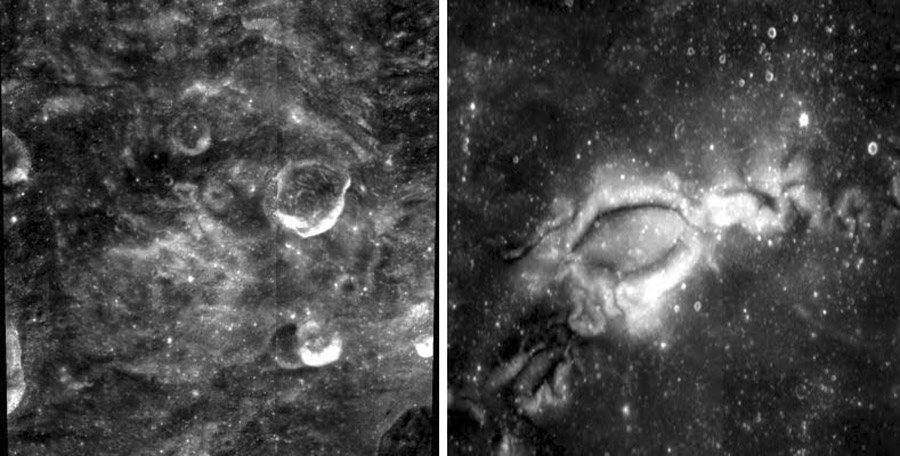Difference between revisions of "August 26, 2011"
| Line 3: | Line 3: | ||
<!-- ws:start:WikiTextHeadingRule:0:<h1> --> | <!-- ws:start:WikiTextHeadingRule:0:<h1> --> | ||
<!-- ws:start:WikiTextLocalImageRule:6:<img src="/file/view/LPOD-Aug26-11.jpg/248528141/LPOD-Aug26-11.jpg" alt="" title="" /> -->[[File:LPOD-Aug26-11.jpg|LPOD-Aug26-11.jpg]]<!-- ws:end:WikiTextLocalImageRule:6 --><br /> | <!-- ws:start:WikiTextLocalImageRule:6:<img src="/file/view/LPOD-Aug26-11.jpg/248528141/LPOD-Aug26-11.jpg" alt="" title="" /> -->[[File:LPOD-Aug26-11.jpg|LPOD-Aug26-11.jpg]]<!-- ws:end:WikiTextLocalImageRule:6 --><br /> | ||
| − | <em>Clementine images of Gerasimovich crater and Reiner Gamma from [http://sites.google.com/site/lunarswirls/home | + | <em>Clementine images of Gerasimovich crater and Reiner Gamma from [http://sites.google.com/site/lunarswirls/home Workshop on Lunar Swirls]</em><br /> |
<br /> | <br /> | ||
| − | Backyard observers and lunar scientists share a fascination with swirls, bright markings that look like powdered sugar sprinkled across the lunar surface. Only a handful of swirls exist and they are totally unrelated to the geology where they occur. Some are opposite impact basins, others aren't. All have magnetic fields, but no one is really sure why. The good news is that a huge amount of new data from India's Chandrayaan-1, Japan's Kaguya and the USA's LRO is now being applied to answer the question, <em>What are swirls?</em> A one day symposium to discuss swirls in light of this new data will be held at NASA's Lunar Science Institute in California on Sept 7, and you can participate. You don't need to buy a plane ticket or look for a hotel roommate because the conference will be streamed live. You can be in the same virtual workshop as the [http://lunarscience.nasa.gov/events/lunar-swirls-workshop-without-walls | + | Backyard observers and lunar scientists share a fascination with swirls, bright markings that look like powdered sugar sprinkled across the lunar surface. Only a handful of swirls exist and they are totally unrelated to the geology where they occur. Some are opposite impact basins, others aren't. All have magnetic fields, but no one is really sure why. The good news is that a huge amount of new data from India's Chandrayaan-1, Japan's Kaguya and the USA's LRO is now being applied to answer the question, <em>What are swirls?</em> A one day symposium to discuss swirls in light of this new data will be held at NASA's Lunar Science Institute in California on Sept 7, and you can participate. You don't need to buy a plane ticket or look for a hotel roommate because the conference will be streamed live. You can be in the same virtual workshop as the [http://lunarscience.nasa.gov/events/lunar-swirls-workshop-without-walls leaders] in this field by registering [http://sites.google.com/site/lunarswirls/who-we-are here] or [http://www.lpi.usra.edu/meetings/lunarswirls2011/who-we-are.html here].<br /> |
<br /> | <br /> | ||
| − | <em>[mailto:tychocrater@yahoo.com | + | <em>[mailto:tychocrater@yahoo.com Chuck Wood]</em><br /> |
<br /> | <br /> | ||
<strong>Related Links</strong><br /> | <strong>Related Links</strong><br /> | ||
| − | [http://www.skyandtelescope.com/news/118592329.html | + | [http://www.skyandtelescope.com/news/118592329.html Lunar swirls] (pdf)<br /> |
<br /> | <br /> | ||
<hr /> | <hr /> | ||
Revision as of 17:38, 11 January 2015
Swirls Without Walls

Clementine images of Gerasimovich crater and Reiner Gamma from Workshop on Lunar Swirls
Backyard observers and lunar scientists share a fascination with swirls, bright markings that look like powdered sugar sprinkled across the lunar surface. Only a handful of swirls exist and they are totally unrelated to the geology where they occur. Some are opposite impact basins, others aren't. All have magnetic fields, but no one is really sure why. The good news is that a huge amount of new data from India's Chandrayaan-1, Japan's Kaguya and the USA's LRO is now being applied to answer the question, What are swirls? A one day symposium to discuss swirls in light of this new data will be held at NASA's Lunar Science Institute in California on Sept 7, and you can participate. You don't need to buy a plane ticket or look for a hotel roommate because the conference will be streamed live. You can be in the same virtual workshop as the leaders in this field by registering here or here.
Chuck Wood
Related Links
Lunar swirls (pdf)



